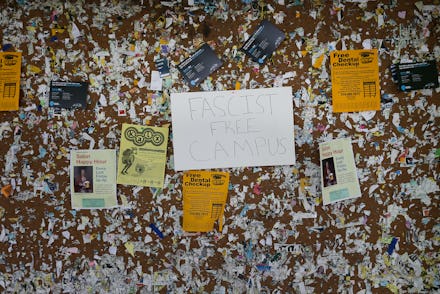These 5 states are drafting laws to limit protests on college campuses

Wisconsin is inching closer to enacting a law that would allow universities to expel students for protesting.
The State Assembly passed the Campus Free Speech Act in a 61-36 vote Wednesday night in an attempt to protect First Amendment rights at Wisconsin's public colleges and universities. Under the law, students who are found guilty of engaging in "dangerous or other disorderly conduct" at speeches or events on campus on two occasions would be suspended for a minimum of one semester. Those with three allegations of disrupting free speech would be expelled.
Supporters of the Campus Free Speech Act allege that the bill protects the First Amendment rights of guest speakers, but critics argue that such a law would infringe upon the protesters' right to free speech. However, bill sponsor Rep. Jesse Kremer said this isn't the case.
"They still have the right to speak," Kremer told CNN. "They can go outside the venue, have their own forums, but the individual has the right to get out what they want."
The Dairy State is not alone in its effort to limit the rights of student protesters. Similar legislation has been proposed in nearly a dozen states nationwide, all with the intention of protecting freedom of speech on college campuses.
Here are four more states working to crack down on on-campus demonstrations.
California
Assemblywoman Melissa Melendez introduced a bill in May that would bar administrators at all of California's colleges — both public and private — from disinviting speakers who are scheduled to speak on campus. On her official website, Melendez said it would not "matter how controversial" the speaker in question is.
Additionally, if passed, the Campus Free Speech Act would establish a system of punitive procedures for students who "interfere with the free speech right of others."
Illinois and Michigan
In February, Illinois state legislators introduced a bill calling for punishment of students who engage in protests that "infringe upon the rights of others to engage in or listen" to a speech or event at all public universities and community colleges. Under the law, students who infringe upon others' freedom of expression two times would either be suspended for at least one year or expelled. Michigan proposed nearly the exact same bill in May.
Both states’ legislation also requires each institution to issue a statement asserting that the college does not intend to shelter people from anyone else’s speech, including “ideas and opinions they find unwelcome, disagreeable or even deeply offensive.”
Louisiana
Louisiana’s proposed Campus Free Speech Act, introduced in March, is almost identical to the laws proposed in Illinois and Michigan. However, unlike the legislation in these two states, which requires students who infringe on other's free speech twice to be suspended or expelled, Louisiana’s bill leaves the choice of punishment up to the respective institution.
The legislation was passed by Louisiana's state Senate and House of Representatives in June and awaits approval from Governor John Bel Edwards.